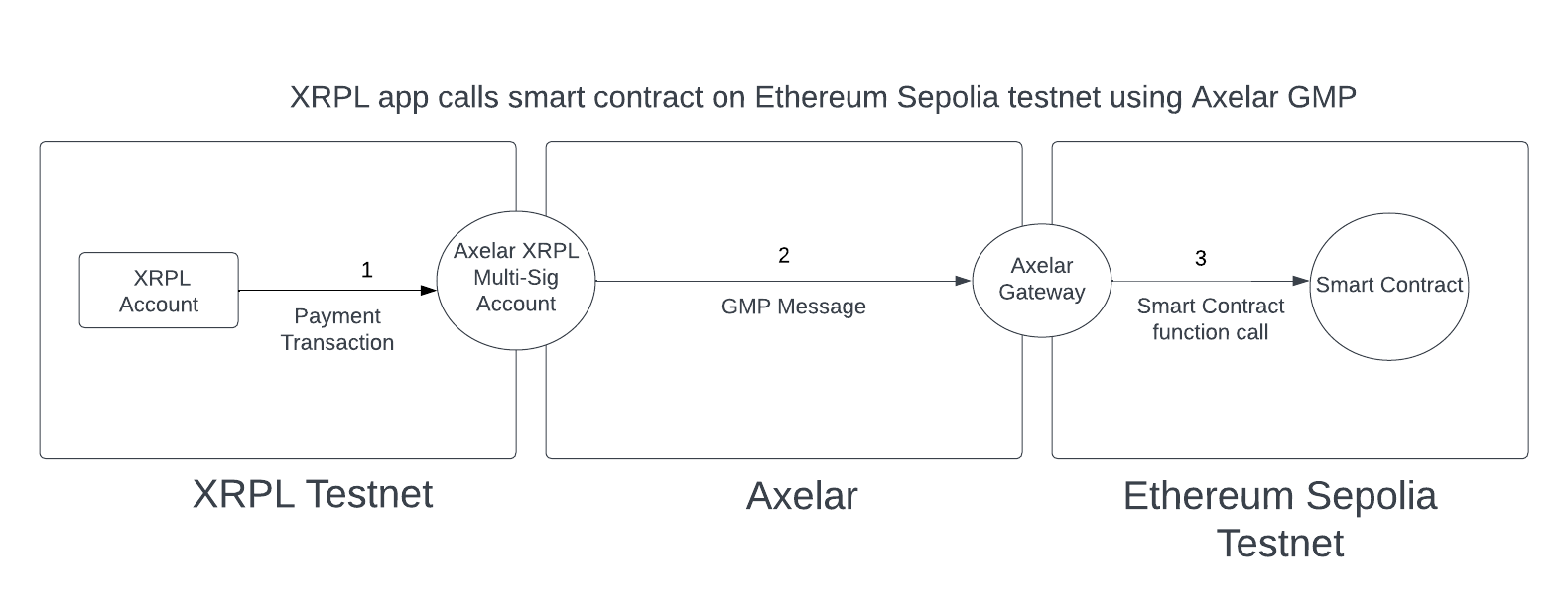Call a Smart Contract Function
Attention
Don't use any funds from a mainnet wallet to perform the actions in this tutorial. The steps outlined are for a testnet deployment, so any funds transferred from mainnet may be lost. Additionally:
-
Gas payments aren't currently supported. You don't need to call
AxelarGasServiceon Ethereum Sepolia to refund our relayer since it's running "pro bono". - The bridge doesn't charge any fees currently.
-
The
IAxelarGatewayinterface andAxelarExecutablesmart contracts used in this tutorial are different from the ones currently deployed by Axelar. Instructions you find elsewhere likely won't be compatible with thistestnetdeployment. -
Only one validator is used to secure this
testnetbridge. - Only one relayer is active.
This tutorial describes how to call a function from a smart contract on Ethereum Sepolia from the XRPL Testnet, using General Message Passing (GMP). The following diagram illustrates the process from a high level:

Prerequisites
- Foundry
- XRPL.js Library
- Ethers.js Library
-
An RPC provider, such as Alchemy or Infura, with the
SEPOLIA_RPC_URLenvironment variable set to a workingSepoliaRPC URL. -
Funded wallets on both chains.
- ETH Sepolia Faucet: alchemy.com/faucets/ethereum-sepolia
- XRPL Testnet Faucet: faucet.tequ.dev
-
To perform GMP from XRPL to Ethereum, the Ethereum smart contract that you wish to call needs to implement the
AxelarExecutablecontract. Please keep in mind that this contract is not the standardAxelarExecutablecontract you would find on other Axelar resources.
Steps
-
Compute the payload (let's call it
gmpPayload) that you would like to call your Ethereum SepoliaAxelarExecutablesmart contract's_executefunction with. -
Submit a
Paymenttransaction on XRPL.-
If you just want to GMP without transferring tokens, set the
Amountto1drop of XRP. -
Set the destination address in the
MemoDatafield to the address of the Ethereum SepoliaAxelarExecutablesmart contract. -
Set the payload hash in the
MemoDatafield tokeccak256(abi.encode(gmpPayload)). You can use theethersJS library to compute this hash:
const ethers = require('ethers'); const encodedPayload = ethers.utils.defaultAbiCoder.encode( ['string'], ['hello, world!'] ); console.log(ethers.utils.keccak256(encodedPayload).slice(2)); -
If you just want to GMP without transferring tokens, set the
-
Within a few minutes, the relayer should submit validator signatures of the XRPL Testnet deposit transaction to the Ethereum Sepolia
AxelarGatewaycontract, which records the approval of the payload hash and emits aContractCallApprovedevent. You can verify that this event was called using the Ethereum Sepolia explorer . -
Call the
executefunction on yourAxelarExecutableEthereum Sepolia smart contract.AXELAR_EXECUTABLE= # your `AxelarExecutable` contract COMMAND_ID= # the `commandId` that was emitted in the `ContractCallApproved` event SOURCE_ADDRESS= # the XRPL address that performed the `Payment` deposit transaction PAYLOAD= # abi.encode(['string', 'uint256', 'bytes'], [denom, amount, gmpPayload]) # where `denom` is `uxrp` for XRP and `uweth` for WETH cast send $AXELAR_EXECUTABLE 'function execute(bytes32 commandId, string calldata sourceChain, string calldata sourceAddress, bytes calldata payload)' $COMMAND_ID xrpl $SOURCE_ADDRESS $PAYLOAD --private-key $PRIVATE_KEY --rpc-url $SEPOLIA_RPC_URL
Example GMP Call
We have created and deployed to Ethereum Sepolia an example AxelarExecutable contract called ExecutableSample.
This example calls the ExecutableSample contract from XRPL to update its message state variable to Just transferred XRP to Ethereum!.
-
Initiate the GMP call by submitting a
Paymenttransaction to the XRPL multisig.import * as xrpl from "xrpl"; const XRPL_RPC_URL = "wss://s.altnet.rippletest.net:51233"; async function gmp() { const client = new xrpl.Client(XRPL_RPC_URL); await client.connect(); // const user = xrpl.Wallet.fromSeed(SEED); // Read XRPL wallet seed from environment or generate and fund new wallet: const user = xrpl.Wallet.generate(); await client.fundWallet(user); const paymentTx: xrpl.Transaction = { TransactionType: "Payment", Account: user.address, Amount: "1", Destination: "rfEf91bLxrTVC76vw1W3Ur8Jk4Lwujskmb", SigningPubKey: "", Flags: 0, Fee: "30", Memos: [ { Memo: { MemoData: "143669292488bd98a0F14F1c73829572f2c25773", // the `ExecutableSample` contract MemoType: Buffer.from("destination_address").toString('hex').toUpperCase(), }, }, { Memo: { MemoData: Buffer.from("ethereum").toString('hex').toUpperCase(), MemoType: Buffer.from("destination_chain").toString('hex').toUpperCase(), }, }, { Memo: { MemoData: "df031b281246235d0e8c8254cd731ed95d2caf4db4da67f41a71567664a1fae8", // keccak256(abi.encode(gmpPayload)), in this example, keccak256(abi.encode(['string'], ['Just transferred XRP to Ethereum!'])) MemoType: Buffer.from("payload_hash").toString('hex').toUpperCase(), }, }, ], }; const signed = user.sign(await client.autofill(paymentTx)); console.log(signed); await client.submitAndWait(signed.tx_blob); await client.disconnect(); } gmp(); -
Wait for the relayer to call
AxelarGateway.execute(). Verify that theContractCallApprovedevent was called using the Ethereum Sepolia explorer . -
Call the
ExecutableSample.execute().AXELAR_EXECUTABLE=0x143669292488bd98a0F14F1c73829572f2c25773 COMMAND_ID= # the `commandId` that was emitted in the `ContractCallApproved` event SOURCE_ADDRESS= # the XRPL address of the `user` who performed the `Payment` deposit transaction # encode(['string', 'uint256', 'bytes'], [denom, amount, encode(['string'], ['Just transferred XRP to Ethereum!'])]) # where `denom` is `uxrp` for XRP and `uweth` for WETH PAYLOAD=000000000000000000000000000000000000000000000000000000000000006000000000000000000000000000000000000000000000000000000000000f424000000000000000000000000000000000000000000000000000000000000000a0000000000000000000000000000000000000000000000000000000000000000661786c58525000000000000000000000000000000000000000000000000000000000000000000000000000000000000000000000000000000000000000000080000000000000000000000000000000000000000000000000000000000000002000000000000000000000000000000000000000000000000000000000000000214a757374207472616e736665727265642058525020746f20457468657265756d2100000000000000000000000000000000000000000000000000000000000000 cast send $AXELAR_EXECUTABLE 'function execute(bytes32 commandId, string calldata sourceChain, string calldata sourceAddress, bytes calldata payload)' $COMMAND_ID xrpl $SOURCE_ADDRESS $PAYLOAD --private-key $PRIVATE_KEY --rpc-url $SEPOLIA_RPC_URL -
AxelarExecutable.messageshould now be set to'Just transferred XRP to Ethereum!'.AXELAR_EXECUTABLE=0x143669292488bd98a0F14F1c73829572f2c25773 cast call $AXELAR_EXECUTABLE 'message()(string)' --rpc-url $SEPOLIA_RPC_URL # Just transferred XRP to Ethereum!